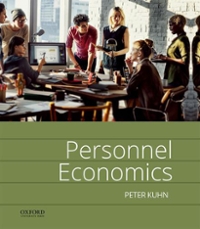1. Results 27.2 and 27.3 characterize agents incentives to join a team and incumbents incentives to admit...
Question:
1. Results 27.2 and 27.3 characterize agents’ incentives to join a team and incumbents’ incentives to admit new members when all members are paid according to the equal sharing rule, Yi = Q/N. Discuss how those results would change if the team used each of the following alternative pay schemes:
a. Arbitrary, unequal shares: Yi = αi Q, where i N
∑ =1 αi = 1 and the α’s are randomly assigned to workers.
b. Full pay for productivity: Yi = di
, that is, each worker is paid for full contribution to the team’s output.
c. Partial pay for productivity: Yi = γdi + (1 − γ) d
–
, where 0 < γ < 1.
Here, every worker’s pay is a weighted average of that individual’s own ability and the group’s average ability, where γ is the weight placed on individual ability.
Which of the preceding schemes leads to adverse self-selection into teams?
Which ones lead team members to prefer to admit only workers who are better than the team average?
Step by Step Answer:







